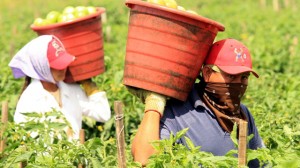This post first appeared in Truthout.
Take a stroll through most grocery stores, and many of the products claim to be organically grown or locally sourced. The foodie movement has swept America in the last decade, thanks in no small part to the work of journalists and intellectuals who have championed the cause online, in print and on the airwaves.
Michael Pollan is inarguably one of the most influential of these figures. Pollan is most famous for his books, especially In Defense of Food: An Eater’s Manifesto (2008) and The Omnivore’s Dilemma: A Natural History of Four Meals (2006). He also contributes regularly to publications such as The New York Times Magazine, where his work has received numerous awards, and is a professor of journalism at the University of California, Berkeley.As organic, locally grown food has emerged as a cultural and economic counterforce to industrialized agriculture, critics have claimed it is elitist and accessible only to those with the resources to pay more for their nourishment. Pollan and his allies have responded, in part, by drawing the public’s attention to the low-wage workers who work in the field, behind the counter and in the kitchen. In recent years Pollan has supported the efforts of the Coalition of Immokalee Workers, an organization dedicated to improving working conditions and wages for tomato pickers’ in Florida; in December 2013 he sided with fast food strikers and their demand for a $15 dollar per hour wage. In an email missive for MoveOn.org (received by eight million subscribers), Pollan wrote: “If we are ever to . . . produce food sustainably and justly and sell it at an honest price, we will first have to pay people a living wage so that they can afford to buy it.” In his words, fair wages must be part of the push to democratize food.
I recently connected with Pollan to discuss equitable food pricing, farm worker rights and industrial agriculture’s role in casting the food movement as elitist. (What follows is a condensed and edited version of our conversation.) I began by asking Pollan about his evolving personal interest in the plight of food workers.

Michael Pollan applauds the Coalition of Immokalee Workers tactics for pressuring the food industry into improving wages and working conditions for tomato pickers in Florida. (AP Photo/Luis M. Alvarez)
“But the food movement is all about connecting the dots,” Pollan continued. “Both the farm workers and the fast food workers are very important in the food system. I think Eric Schlosser did this better than anyone in Fast Food Nation (2001), where the focus was very much on food workers, slaughterhouse workers and farm workers. I think he’s helped to sensitize a lot of people in the food movement who perhaps weren’t paying as much attention to this part of the puzzle as they should have been. You definitely find the interest spreading and accelerating as social inequality has gotten so much worse in the last few years.”
Why, I wondered, is there this impression of the food movement as an elite venue? And why is it that the only people who can afford local, organic options are generally those who don’t have to worry about their pay?
“Although there’s a kernel of truth in that image [of a foodie elite],” he responded, “it’s also a part of the rhetorical strategy used by the [agricultural] industry to fight the food movement: that it’s elitist; that this kind of food can’t feed the world; that only industrial agriculture can get the job done and put lots of cheap meat in front of us. It’s a bludgeon used in a very serious ideological battle.
“Often stereotypes have some kernel of truth behind them, and this one did, but it’s been way overplayed by the media, in particular. They love this idea that the food movement is merely elitist. But if you dig in, there’s an inner-city dimension of the food movement. Urban agriculture is all about access, underserved communities and the whole discourse around food deserts.
“When you buy cheap food, the real costs have been externalized,” Pollan continued. “Those externalized costs have always included labor. It is only the decline over time of the minimum wage in real dollars that’s made the fast food industry possible, along with feedlot agriculture, pharmaceuticals on the farm, pesticides and regulatory forbearance. All these things are part of the answer to the question: Why is that crap so cheap? Our food is dishonestly priced. One of the ways in which it’s dishonestly priced is the fact that people are not paid a living wage to process it, to serve it, to grow it, to slaughter it.”
I said that Pollan made a great point about the devil’s bargain of cheap products for cheap wages, but noted that state farm bureaus and other agricultural industry representatives across the country would no doubt disagree. Opponents of fair wages claim that increased farm worker pay will result in higher food prices. I asked Pollan if this kind of scare messaging resonates with his base of supporters in the food movement.

Dora Farmer, 70, a carhop at Sonic Drive-In in Las Cruces, NM, fills a customer's order. (AP Photo/Las Cruces Sun-News, Norm Dettlaff)
I absolutely agree, of course, but will those higher prices, or the threat of higher prices, scare off support for workers among eaters who consider themselves part of the food movement?
“It’s a politically potent argument,” Pollan admitted. “It needs to be repelled by pointing out that we need to pay people a living wage so they can afford to pay the real cost of food. Cheap food is really an addiction for an economy and for a society. Cheap food is one of the pillars on which our economy is based. It is what has allowed wages to fall over the last 30 or 40 years, the fact that food was getting cheaper the whole time. In a sense, cheap food has subsidized the collapse in wages that we’ve seen. Part of repairing the whole system will involve paying people more and internalizing the real cost of producing this food.”
I next asked Pollan to point to some of the bright spots around the country where fair wages and working conditions for food workers are being successfully promoted. He flagged the Coalition of Immokalee Workers (CIW) labor activists who are based in the corner of southern Florida that provides a third of America’s tomato harvest. Farm laborers in the region have been subjected to almost every indignity and injustice imaginable, including slavery.
“The Coalition of Immokalee Workers has been a real beacon on this issue,” he said. “That has been a very successful movement to pressure the food industry into improving, not just the earnings, but the working conditions of some of the most exploited workers in the country. The way it was done was through the creation of a pledge, The Fair Food Agreement. Then they applied pressure through everything from negotiation, boycott, shaming – every tool in the political kit — to move several big companies to sign on. I think that that’s an interesting model. There’s the model of obviously legislating higher wages, and that’s one way to do it. But this has been a boycott led by activists and consumers and has received a lot of support from the food movement over quite a number of years.”
The innovative and comprehensive tactics utilized by the Coalition of Immokalee Workers is an excellent example of food workers taking the fight to the companies. While they initially utilized the strike as a primary tactic, the group has had far greater success with secondary boycotts and other kinds of public pressure campaigns targeting brand-sensitive companies. Walmart just signed onto their Fair Food Program, which sets an industry standard of higher wages by charging one penny more in wages per pound of tomatoes picked.
I asked Pollan what other groups can learn from CIW’s example.
“They didn’t appeal to any government — state, federal or local,” Pollan responded. “They created a model pledge, [The Fair Food Agreement] that they thought would be just, and then they moved everybody there. They understood something very important. In today’s world, where government is knotted up, corporations can unilaterally make important concessions when their brands are under attack. Brands are their most important assets. When activists understand that and figure out clever ways to threaten their brands, they can achieve important gains. I think that’s the lesson of the Coalition of Immokalee Workers. They really did take the high road, but it was also unrelenting pressure. If you talk to people [in management] at Burger King or Chipotle, I think you’ll find they felt besieged for a long time.”
“It’s long overdue,” he said. “It has been driven by the fact that the identity of the fast food worker has changed. We tolerated these wages when it was our kids working in these places. You walked in, and you saw a fast food worker, and he was a 17 year old. Now you walk into a fast food outlet, and you find adults holding these same jobs. That’s a measure of what the economy has become.
We’re catching up in our recognition that a lot of special exemptions were made for fast food companies because they were employing teenagers, students and part-time workers.
“Then there is the fact that has really caught people’s attention, which is how much public money goes to keeping those people whole,” Pollan concluded. “There is an implicit subsidy of McDonald’s or Walmart, when their workers need food stamps and Medicaid. Once again the real cost of having those workers is not paid by the corporations or by consumers. It’s being paid by the taxpayer. The recognition of that has driven an enormous increase in support for the fast food workers. It’s an important movement to watch.”
Copyright: Truthout.org. Reprinted with permission.



